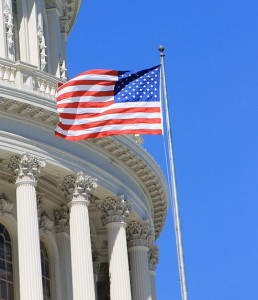Religious Liberty? In America?

Dear American Politicians, religious liberty is for everyone.
When it comes to the unalienable rights of “life, liberty, and the pursuit of happiness,” religious freedom is vital. While various supernatural and religious beliefs have historically served as the root of many of the world’s conflicts, since 2013 there has been a surge in violent retaliation to any opposition or criticism of religious or philosophical views. Recent events throughout the world have shown the necessity of religious freedom protections. For the past three years we have seen instances of atheist writers in Bangladesh attacked or murdered simply for their atheist viewpoints. On January 7, 2015, the offices of the French satirical magazine Charlie Hebdo were attacked for publishing cartoon depictions of the Islamic prophet Muhammad, leaving twelve dead. Just last month a twenty-year-old woman in Arizona was murdered for not believing in God. And the ongoing debate about immigration and the Syrian refugee crisis is a constant reminder of how dangerous religious bigotry can be.
One might think that a “civilized” nation like the United States would be more tolerant of world religions. After all, our most powerful governing document, the Constitution, guarantees the free exercise of religion—including the right to not practice any religion. But time and again, the behavior of American politicians unsurprisingly shows otherwise. Our politicians have a knack for creating fear to ensure the loyalty of their constituents.
So who is America supposed to fear the most? Muslims, of course. The hottest new trend in outgroup hatred is the surge of Islamophobia that has been growing since the early 2000s. According to ThinkProgress, there have been at least forty-two acts of hate against Muslims in the US since November 2015. While most of us ignore the babblings of presidential candidate Donald Trump, the sad truth is that he does have many supporters who take his words to heart. On multiple occasions, Trump has warned refugees that they would be removed from the United States the moment he enters office. Despite this anti-immigrant rhetoric that is anti-Islamic in nature, he verbally professes his love for Muslims, making no effort to appear consistent in his thoughts or in educating his followers on how to judge a person’s character regardless of their personal religious preferences.
Another presidential candidate, Senator Marco Rubio (R-FL), has also forgotten about religious freedom and church/state separation as he continually refers to the US as a Christian nation. In a recent political campaign ad, Rubio tugs on the Christian heartstrings of conservative America with a not-so-subtle pro-Christian message. Most politicians do their best to sneak religion into their politics. It seems Rubio forgot the sneaky part in his promotional video for evangelical Christianity.
Scarier yet is the religious privilege in the foremost important institution responsible for protecting civil liberties and constitutional rights. Equally hated as he is loved, Supreme Court Justice Antonin Scalia has often confused the Constitution with his Bible. Not only does Scalia believe nonreligious Americans deserve less protection than Christian Americans, he truly believes Christianity is exempt when prohibiting religious influence in politics.
I won’t deny that American politicians believe in religious freedom. They do. The only condition is that the religion must be theirs. How do you explain that all religious people and nonreligious people deserve the same protections when our politicians believe theirs is the only true religion? How can different religions coexist under the same laws when those laws are formulated by politicians who unabashedly believe their own religion is superior? Until politicians are called out for their favoritism and actions that are inconsistent with the principle of religious liberty, we are dangerously far from the secular values our founding fathers knew to be vital to a democratic system.
